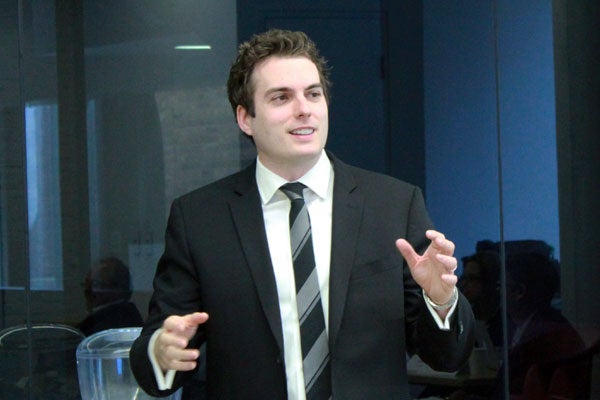
U of T's Creative Destruction Lab backs entrepreneurs
Published: June 26, 2013
Connecting innovators with successful entrepreneurs and investors was at the heart of the first year at the Creative Destruction Lab at the University of Toronto’s Rotman School of Management.
Eight ventures successfully completed an eight-month “boot camp” raising their collective value by $60 million with three of the ventures raising money from the markets. U of T entrepreneurs who survived the challenge include: Cliff van der Linden of Vote Compass, who is currently working on his PhD student in Political Science; alumnus Karl Martin, chief executive officer of Bionym, who holds a PhD in Electrical and Computer Engineering from U of T; and alumni Aidan Nulman and Yilun Zhang of Fleetbit.
“We entered this year believing that if we could match high potential ideas and inventors with some of Canada’s most successful entrepreneurs and Canada’s top MBA School we would create at least one venture with the potential to be massively scalable,” says Ajay Agrawal, Peter Munk Professor of Entrepreneurship at the Rotman School and the Lab’s academic director.
The Lab opened its doors in November 2012 to eighteen early-stage ventures. The program for the ventures provided them with an advisory board of seven highly successful entrepreneurs and investors who would provide coaching on a wide-range of issues relevant to each venture. Meetings between the board members and the ventures were held every five to six weeks. (Read more about Creative Destruction Lab.)
Lower-performing ventures were cut from the program with eight of the eighteen making it to the final meeting in June.
“We took a customized approach to what each venture would need to learn and grow," said Jesse Rodgers, the Lab’s Director. "We see ourselves as complimentary to other programs available out there – no one is required to raise money or change their strategy unless they decide it makes sense for them.
"But the ventures also had to perform up to our expectations to stay in the Lab."
In addition to the support from their board, the ventures also worked with Rotman MBA students from Professor Brian Silverman’s Venture Capital program who were involved in the Lab as part of their course study.
The eight ventures which complete the year are:
- Thalmic Labs – First venture to raise capital and took 30,000 orders for their Myo armband, a gesture control device for human/computer interaction
- Weston Expressions – Creators of interactive advertisement systems, they were the second venture to secure funding
- Bionym – Creators of the biometric security system Nymi based on research developed at the University of Toronto, they have recently closed a fundraising round
- Vote Compass – A voter literacy tool which has been used in elections in Australia and Canada
- Fleetbit – a taxi booking apps service with operations throughout Canada and the United States
- DonorIQ – the next generation of CRM tools for fundraisers
- Chematria – improves small molecule drug discovery by using big data
- Oncoustics – ultrasound-based, cancer treatment monitoring technology that will help improve the outcome of cancer therapy
The Creative Destruction Lab at Rotman is a venture lab that leverages: the business school's leading faculty and industry network; inventions and talent from the world-class, technology-oriented faculties at the University such as Computer Science, Engineering, and the University Health Network as well as from other universities such as the University of Waterloo; and, its location in the heart of Toronto – North America's third largest financial centre and one of the world's most culturally diverse cities, to achieve its mission.
The Lab supports start-ups by providing guidance from experienced entrepreneurs on how to most effectively allocate scarce resources to maximize the chance of venture success; access to early-stage investors; introductions to strategic relationships including customers, partners, recruits, investors; workshops on a variety of topics that are designed to increase the probability of venture success; as well as some professional services and office space.
The Lab will be hosting DemoCampUofT on September 12, which is open to all members of the University of Toronto community. Applications from ventures are also now open for the second cohort beginning in the Fall 2013. Information for both the event and how to apply can be found at the Creative Destruction Lab website: http://www.creativedestructionlab.com/
Ken McgGuffin is a writer with the University of Toronto's Rotman School of Management.



